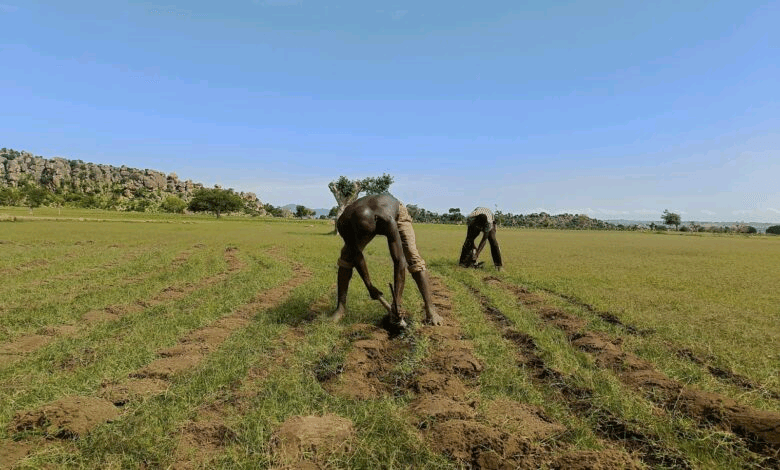From Umar Danladi Ado, Sokoto
At least 70 per cent of farmers may not be able to farm all around this year unless holistic and drastic measures have been taken to tackle insecurity challenges in Sokoto State.
A non-governmental organisation, Justice for Peace stated this in Sokoto on Sunday and also said that over 200 villages have been deserted in five local government areas of Sokoto East Senatorial District as a result of terrorists activities.
Chairman of the association Sokoto State chapter, Alhaji Basharu Altine Guyawa Isa, warned that if the current tempo of terrorists’ attacks is allowed to continue unchecked within the technically allowed time of planting and replanting, there is the likelihood of loss of production of millet valued at N365.75 billion.
However, expressed optimism that the menace could be reduced by half if timely brought in check.
According to the results of survey statistics released by Guyawa stated that the expected farmers who grow principally millet, sorghum, watermelon, cowpeas, cabbage, onion, and garlic in commercial quantities may be affected as a result of Banditry activities.
At least,1,032,900 land areas have been affected in the five local government areas as Sabon Birni with 235,400,
Isa had 215,800, while Goronyo has 170,400, Wurno with 168,500 and Rabah has 243,000, respectively.
According to him, the source from the Ministry of Lands and Housing, Sokoto, 2023 further stated that 70% of the land, according to information from the Ministry of Agriculture, is Cultivatable, which stands at 723,000 Hectars. An average of 70% of this is cultivated annually or 433,818 hectares
The average yield of millet according to FAOSTAT, is about 1.2 tonnes per hectare. This gives 520,581.6 tonnes. One tonne gives, on average, 13 bags of millet. Or 6,767,560 bags.
The current market prices range between N85,000 to N105,000 per bag.
“We choose N95,000 per bag as a representative. This amounts to N642,918,200,000 or 642.918 billion Naira in gross terms”,
“The activities of terrorists have rendered 70% of the farms inoperative and 70% of this revenue is likely to be lost, which is N385.75 billion Naira”.
The eight areas worse affected in the Sokoto East Senatorial District comprise Sabon Birni, Isa, Goronyo, Rabah, Gada, Wurno, Illela, and Gwadabawa local government areas.
All of them have been affected by the activities of terrorists to varying degrees. However, the worst affected local governments are Sabon Birni and Isa and, to some extent, Goronyo, Wurno, Rabah, and Illela.
In the past six months, there has been an escalation of activities of these bandits, following their migration from Zamfara and Katsina States.
The fleeing bandits settled largely in Sabon Birni, Isa, and Goronyo forest areas close to Shinkafi, the base of Bello Turji, who now assumes the role of General Officer Commanding and coordinating their activities.
The terrorists daily attack farmers and travellers alike, killing, kidnapping, maiming, and imposing taxes and levies as well as preventing farmers from undertaking their regular farming activities.
However, Sokoto to Sabon Birni and Isa roads have become death traps where killings and abductions occur daily.
Sabon Birni, a local government area has now become the epicentres of banditry, while communities of Gatawa, Tarah, Gidan Idi, Nasarawa, Zangon Malan, Kalgo, Burkusuma, Lajinge, Teke, Tashar Bagaruwa, Rambadawa, Dan Kware, Dantasakko remain the area of bandits attacks on daily basis.
About 200 other villages are affected, and are routinely attacked in broad daylight despite the presence of inactive security agencies who always say to the community affected that they were not directed to act immediately.
The story of bandits’ activities is the same in Isa local government Arewa and its surrounding communities such as Turba, Kamarawa, Bafarawa, and Tozai, and more than half of all the villages around them are similarly being attacked daily.
He noted that recently, bandits kingpin Bello Turji and his commanders issued a decree in the area that anyone seen on his farm be shot dead.
In addition to this, those who desired to farm were levied outrageous sums beyond their capacity to pay.
With this scenario, most of the villages have been deserted and the people were taking refuge in Isa and Sabon Birni, Niger Republic as well as Sokoto and other related towns and communities.
Some in the bushes, or forest and return home in the morning, only to be attacked again in the early afternoon or evening.
Consequently, farming activities have been drastically reduced to the lowest percentage in most parts of the major towns and communities affected towns and villages who were surrounded areas by the bandits, altogether their mental activities were stopped.
We’re in the weeding season now but most farmers are yet to plant for lack of seeds and fear of being either killed, maimed, or abducted.
It was established (through the survey by the concerned citizens that more than 70 per cent of the farmers may not be able to farm at all this year.
The farmers principally millet, sorghum, watermelon, cowpeas, cabbage, onion, and garlic in commercial quantities.
Insecurity challenges in the area have established the economic impact of this sordid and scary situation using millet as a case crop in five of the local government areas Birni, Isa, Goronyo, Rabah, and Wurno.
According to him, millet was chosen because it is the principal crop grown all over the District both in sole and inter-cropping combinations and the reconnaissance survey carried out by the concerned citizen found that at least 70 per cent of the area is covered by the crop.
The implications of this huge loss to the economy of just five local governments in only one of the dozens of crops are obvious:
Massive food scarcity and hunger which even the whole state budget can not handle.
An urgent call for action as the multiplier negative effects trance to the shores of the affected local governments and the States in general.


